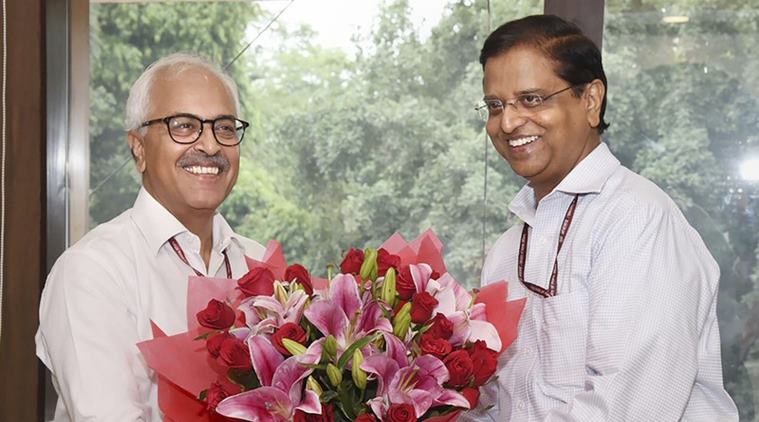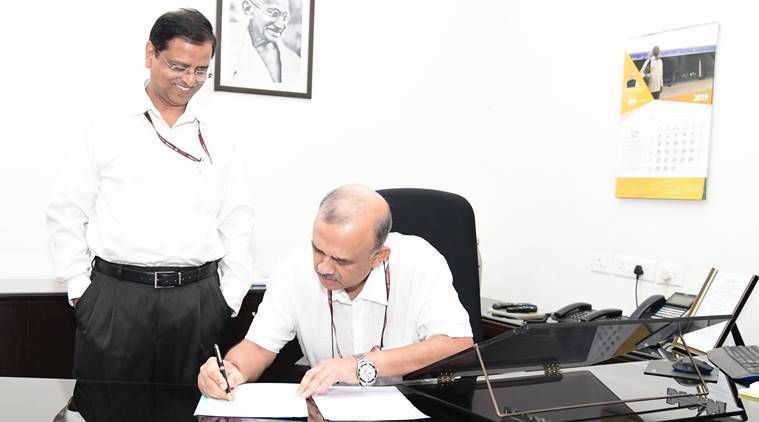
Taking charge as Power Secretary, former Finance Secretary Subhash Chandra Garg Friday said “no one in the government” had opposed the idea of sovereign bond issuance during his tenure in the Finance Ministry.
On Thursday, the day after he was moved out of the Finance Ministry, Garg said he had applied for voluntary retirement from the IAS with effect from October 31 — he was due to retire in October 2020. Gujarat-cadre officer Atanu Chakraborty has replaced him at the helm of the Department of Economic Affairs.
Responding to questions from newspersons Friday, Garg said the sovereign bond proposal is aimed at improving resource availability for the private sector as high fiscal deficit results in the government eating into a majority of the country’s savings, thereby crowding out the private sector.
He also clarified that he had discussed his decision to opt for voluntary retirement with the Prime Minister’s Office on July 18 and put in a formal request on July 24. He declined to go into the reasons for his decision to retire early: “I don’t think we should discuss those reasons. Let’s rest that matter as that was discussed and I conveyed my decision much before. So, this move has nothing to do with it.”
As Secretary, Department of Economic Affairs, he was spearheading the proposal of issuance of sovereign bonds in foreign currency on overseas markets — a proposal which was announced by Finance Minister Nirmala Sitharaman while presenting Union Budget 2019-20. This proposal is opposed by influential sections of the government.
“The risks (of sovereign bond issuance) are much less and during the time I was there, I had not heard anyone in the government questioning it,” Garg said. Issuing sovereign bonds abroad are a very normal way of raising resources and will help in improving availability of funds for the private entrepreneurs, he said.

“We are one of the countries with high fiscal deficits, the internal resources are not that much. We need to get some (funds). We have very small external liabilities and those liabilities are also largely from multilateral, bilateral and government accounts. The government does not have any private external liability except what comes through the FPI route indirectly where you do not have the foreign exchange risk. I think we have a perfectly legitimate case for considering this. Nineteen out of twenty G-20 countries raise sovereign bonds. So it’s a very normal way of doing things,” he said.
The savings rate in the country is about 10-11 per cent and the government takes about 8-9 per cent of those savings. Therefore, the government needs to diversify its borrowing to ensure enough funds are available for the private sector, he said.
Garg, who was also a member of the Bimal Jalan-led expert panel to review the Reserve Bank of India’s economic capital framework, said the committee is yet to reach a conclusion. In the middle of last year, the Department of Economic Affairs under Garg started internal discussions with the RBI over the latter’s economic capital framework and assessed that the central bank has around Rs 3.6 lakh crore of excess capital that can be shared with the Centre.
He is also seen as the officer behind the Centre’s proposal mandating the Securities and Exchange Board of India (SEBI) to share 75 per cent of its surplus funds with the Union government. The proposal to dip into reserves of SEBI and RBI have led to major differences between the Finance Ministry and the regulators.
On his new role in the Power Ministry, Garg said the sector is critical to achieving the goal of $5-trillion size for the Indian economy. “The dream of $5 trillion would not be achieved without power sector. The growth is dependent on power sector. In that respect, we have challenges in power sector like financial health (of firms, utilities),” he said.
[“source=indianexpress”]
















